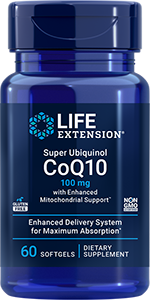
Does CoQ10 Help Support Your Liver Health?
Published: March 2024
Coenzyme Q10, aka CoQ10, hardly needs an introduction. It has become one of the most popular supplements in the nutrition world, and for good reason! It is a powerful antioxidant, protecting cell membranes, lipids and tissues from damaging free radicals. It is also one of the top heart health supplements, and it can help fight the effects of general fatigue. CoQ10 is just one of those all-around nutrient superstars.
Did you know coenzyme Q10 also promotes liver health? Your liver is a critical player in overall health and wellness, so let's take a closer look at how CoQ10 encourages healthy liver function.
CoQ10 helps support liver health in more than one way, but its support of energy may be the most noteworthy one. Your liver is a marvel of an organ, with over 500 indispensable functions in the body. But you probably know it best for detoxification. The liver helps break down potentially harmful substances for excretion by the body, either in bile (to be excreted in feces) or in blood (to be filtered by the kidneys and excreted in urine).
The liver has many other functions, too, like converting excess glucose into glycogen for longer-term storage, storing iron, and regulating blood clotting. It is also involved in the synthesis of cholesterol and some immune factors.
All this work means the liver needs a lot of energy. Under resting conditions, your liver can contribute to about a quarter of your body's total heat production. That's 25% of your body's resting metabolic rate! When we say it's a workhorse organ, we mean it.
To make all that energy, your body needs coenzyme Q10 for healthy mitochondrial function. (Remember, mitochondria are the powerhouses of cells that provide energy in the form of ATP.) So aside from protecting your liver from damage, CoQ10 also helps provide the energy your liver needs to continue doing its all-important job of keeping your body free of toxins.
In general, you get some CoQ10 from foods like fatty fish, organ meat (like liver), and whole grains, and your body makes plenty on its own. However, with age comes declining levels of CoQ10 production. This is where a CoQ10 supplement can help.
Additionally, CoQ10 is an antioxidant. It not only protects the entire body from damaging factors like free radicals, but it also helps inhibit inflammatory factors to support whole-body health. Liver cells, called hepatocytes, are susceptible to oxidative stress. CoQ10 helps protect hepatocytes and the organelles inside them from threats like free radicals and lipid peroxidation, which in turn helps to preserve liver function.
How does CoQ10 affect liver enzymes?
Supplementation with CoQ10 has been shown to promote serum levels of circulating liver enzymes. You may be familiar with some of the commonly tested enzymes and biomarkers for liver function, including ALT (alanine transaminase), AST (aspartate transaminase or aspartate aminotransferase), ALP (alkaline phosphatase), and GGT (gamma-glutamyltransferase). While this may look like alphabet soup, aspartate aminotransferase and the others are all very important enzymes that can help measure liver function and health.
In a meta-analysis of 13 randomized controlled trials, CoQ10 supplementation was shown to encourage healthy serum levels of ALT, AST, and GGT. The dosage of coenzyme Q10 varied between studies but was often 100 mg daily for at least several weeks. This promotion of liver enzymes suggests that CoQ10 can help support healthy liver function.
What are other benefits of CoQ10?
As we mentioned before, CoQ10 is an enormously popular nutritional supplement and has been used for decades. In addition to supporting liver function, CoQ10 has been shown to have numerous health benefits, including:
- Supporting heart health
- Inhibiting inflammatory factors to support whole body health
- Fighting the effects of general fatigue
- Providing antioxidant support, including promoting antioxidants made by your body
Ubiquinol vs. Ubiquinone
If you've seen the words "ubiquinol" and "ubiquinone" and are unsure how they fit into the CoQ10 picture, let us fill you in. Both ubiquinol and ubiquinone are names for different forms of coenzyme Q10. Ubiquinol is the reduced, active form, and is generally more bioavailable than the ubiquinone form. Ubiquinone has been around for longer, though, so there are more studies done with this form.
Ultimately, either form can be used to support CoQ10 levels, but the extent will vary from person to person. Blood tests are available to measure CoQ10 levels, so you can see which form and dose works best for you.
Explore Our Best Liver Health / Detoxification Supplements
How else can I support liver health?
Your liver does a lot for you. It plays a role in almost everything your body needs to do to keep you going. There are lots of ways to support your liver, and fortunately, most of these tips will benefit your whole-body health, as well.
Get tested regularly.
Test for serum levels of liver enzymes and other biomarkers of liver health, like bilirubin. Serum liver enzyme levels are generally included in routine bloodwork, but it's important to follow up on any out-of-range results.Exercise.
Look, we don't have to tell you this—you need to exercise. General recommendations are to get at least 150 minutes of moderate-intensity physical activity per week. The good news is that this can be broken up however you like—and it will benefit your body from head to toe, including your liver. So, get moving (or jumping, or dancing, or swimming).Eat a balanced diet.
You might be sick of hearing this, but there is a reason why diet and exercise turn up on every list to support your health. Nutrition really is key. Adhering to a healthy dietary pattern, like the Mediterranean diet, can support liver health and function. The healthiest dietary patterns focus on eating a lot of fruits and vegetables (at least 3-5 servings each day), whole grains, legumes and nuts, and healthy fats like extra virgin olive oil, while avoiding foods that are high in saturated fats and added sugars.Consider taking a supplement for liver health.
Aside from CoQ10, there are many liver health supplements that may help support your liver. Certain probiotics, as well as milk thistle and curcumin, may help promote healthy liver function. Be sure to talk to your healthcare provider before trying a supplement for liver health.Ease up on the alcohol.
Experts recommend drinking in moderation or not at all. Your liver is responsible for detoxifying and filtering alcohol from your blood, and each drink puts more strain on the hepatocytes and delicate organelles within your liver.Maintain a healthy weight.
Excess fat tissue can have adverse effects on liver function.
Is it better to take CoQ10 at night or in the morning?
It's best to take a coenzyme Q10 supplement at a time when you are most likely to remember to take it. Morning or night does not really matter much, but consistency does. Decide on a time that works best for you.
The only thing to keep in mind is that CoQ10 is fat-soluble, so it absorbs best with food. Taking it with a meal may also encourage digestive comfort (although discomfort from CoQ10 is rare).
Can you take CoQ10 every day?
Research shows that you can take coenzyme Q10 every day. CoQ10 has been administered in clinical studies lasting for months or even years with no significant issues. Importantly, CoQ10 will have the most benefit when taken for at least several weeks, and many clinical studies show benefits last at least a month beyond supplementation.
It is, of course, essential to always follow the directions and dosage on the label for any dietary supplements and use them as directed. Also, speak to your healthcare provider before starting any new supplements.
If you're looking for additional support for your liver health, check out our liver health quiz. It will give you a personal recommendation for the nutrients that may be right for you.
References
- Ardekani A, et al. "Effects of coenzyme Q10 supplementation on lipid profiles and liver enzymes of nonalcoholic fatty liver disease (NAFLD) patients: A systematic review and meta-analysis of randomized controlled trials." Food Sci Nutr. March 2023. https://www.ncbi.nlm.nih.gov/pmc/articles/PMC10261764/
- Bai M, et al. "Relationships between interspecific differences in the mass of internal organs, biochemical markers of metabolic activity, and the thermogenic properties of three small passerines." Avian Research. June 2016. https://avianres.biomedcentral.com/articles/10.1186/s40657-016-0046-1
- Dabbaghi Varnousfaderani S, et al. "Alleviating effects of coenzyme Q10 supplements on biomarkers of inflammation and oxidative stress: results from an umbrella meta-analysis." Front Pharmacol. August 2023. https://www.ncbi.nlm.nih.gov/pmc/articles/PMC10442645/
- Gong J, et al. "Hepatocytes: A key role in liver inflammation." Front Immunol. January 2023. https://www.ncbi.nlm.nih.gov/pmc/articles/PMC9890163/
- López-Lluch G, et al. "Is coenzyme Q a key factor in aging?" Mech Ageing Dev. April 2010. https://pubmed.ncbi.nlm.nih.gov/20193705/
- Mizuno K, et al. "Ubiquinol-10 Intake Is Effective in Relieving Mild Fatigue in Healthy Individuals." Nutrients. June 2020. https://www.mdpi.com/2072-6643/12/6/1640
- Pelton R. "Coenzyme Q10: A Miracle Nutrient Advances in Understanding." Integr Med (Encinitas). April 2020. https://www.ncbi.nlm.nih.gov/pmc/articles/PMC7482328/
- Saini R. "Coenzyme Q10: The essential nutrient." J Pharm Bioallied Sci. July 2011. https://www.ncbi.nlm.nih.gov/pmc/articles/PMC3178961/
- Soleimani Damaneh M, et al. "The effect of coenzyme Q10 supplementation on liver enzymes: A systematic review and meta-analysis of randomized clinical trials." Food Sci Nutr. June 2023. https://www.ncbi.nlm.nih.gov/pmc/articles/PMC10494615/
- Sangouni AA, et al. "Effect of Mediterranean diet on liver enzymes: a systematic review and meta-analysis of randomised controlled trials." Br J Nutr. October 2022. https://pubmed.ncbi.nlm.nih.gov/34165054/
- Tamber SS, et al. "Biomarkers of liver diseases." Mol Biol Rep. September 2023. https://pubmed.ncbi.nlm.nih.gov/37482588/
- "Coenzyme Q10." Linus Pauling Institute. May 2018. https://lpi.oregonstate.edu/mic/dietary-factors/coenzyme-Q10
- "Liver: Anatomy and Functions." Johns Hopkins Medicine. https://www.hopkinsmedicine.org/health/conditions-and-diseases/liver-anatomy-and-functions








